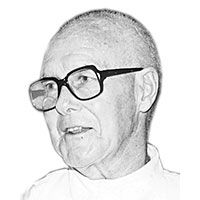Forgiveness

A long time ago, at Sacred Heart Novitiate in Novaliches, I was making my own annual retreat. I was reading the Gospel of Saint Matthew. Fifth Chapter, the Sermon on the Mount. I have read that Sermon on the Mount many times, so I did not expect to find anything new. I felt that it was a review, renewal. But suddenly one sentence struck me. Our Lord said:
“If anyone would borrow from you, turn not away!”
It struck me because, at that time I was teaching Sophomore A.B. at the Ateneo de Manila, Latin and English. And I had my students memorizing the beautiful, truth-laden, wise lines of Shakespeare. One of the passages they were supposed to memorize was Polonius to Laertes, in Hamlet, Act II:
“Neither a borrower or a lender be,
for loan oft loses both itself and friend,
and borrowing dulls the edge of husbandry.”
I wondered who was right — Shakespeare in Hamlet or Christ Our Lord on the mountainside. After thinking about it, it seemed to me that Our Lord could not have meant those lines seriously, literally, because the trouble with borrowing and lending is that you do not get back the thing you have loaned. I was sure that, somewhere in the Gospel, Our Lord would quality that statement, so that it really meant:
“Lend. . . .but be sure that
you have sufficient collateral.”
So I went to the small type at the bottom of the page in the Gospel, where it tells you all the other places where Our Lord says the same thing, but in different words. I began reading the things he said. And every passage made it worse!
He said:
“If anyone would take your
garment from you, give him
also your shirt!”
“If anyone would force you to go
one rule with him, go two!’
But the crusher came when I reached the Gospel of Saint Luke. There, Our Lord says:
“If you lend to those who
can pay back, what credit
is that to you? Even the pagans
do that — lending, expecting to those
who can not pay back, and your
reward will be great in heaven.”
I meditated over that. When I came home after the retreat, the moment I reached the Ateneo, in the lobby of the faculty house, there were three young men from the University of the Philippines. They were very pleasant, gentlemanly, polite.
They said, hopefully: “We would like to borrow your spotlights.”
My heart sank. Because my spotlights were 110 volts, and needed a transformer. The last time that UP borrowed those lights, I told them that. The students who did the borrowing said: “Yes, Father!” But in the excitement of their production the lights went into the control of someone else, who plugged them into 220, and blew them out. They brought back the lights and said, sadly: “They broke.”
I went up to see the Rector, because a Jesuit has to have permission when he lends the property of the school. The Rector was Father Jim McMahon, who was my best friend. I said: “Jim. . . .UP is downstairs. They want to borrow our spotlights.”
He said, at once: “No!. . . No!. . . The last time they borrowed those lights, they blew them out!. . . . No!”
I said: “Well, my difficulty is Matthew, Chapter Five. Our Lord said, on the mountainside: ‘If anyone would borrow from you, turn not away!’”
He looked at me for a moment, in silence. Then he said: “I’m busy. . . .I’m very busy!. . . . I know that passage means something. . . . . But it doesn’t mean that we have to lend them our spotlights! No!. . . . Tell them ‘No!’”
But maybe the Gospel does mean that we should lend our lights. It is in harmony with everything else that Our Lord said, and did. He felt that things were not important. The first beatitude: “Blessed are the poor in spirit” means: “Blessed are those who are detached from things! Blessed are they who have possessions, but are not possessed by them! Blessed is the one who would rather give than take.”
If you lend, you might lose what you lend, but you gain a friend. And friends are more important than things. In the Gospel, what counts is not what you have, what you own, what you possess, but what you give! When you give yourself, that is the most beautiful gift of all. It is love. And that is the central message of the Gospel.
After the Civil War, in the United States, the President, Abraham Lincoln, wanted to grant amnesty to all the enemy. His councilors objected, saying: “In combat, it is a prime principle: destroy your enemies!” Lincoln said: “If I make my enemies my friends, I have destroyed my enemies.”
And the truth that is sweeping diplomatic circles right now is that the only solution to the problems of our world is. . . . forgiveness. If we insist on justice, we will end up killing each other, at short range.
It is one page out of the Gospel, taken literally: “Love your enemies. Do good to those who have injured you.”. . . . “Pardon, and you will be pardoned.”
We listen to the Gospel every time we go to Mass. Protestants listen to it in their every service. It is the world’s best seller. Parents read it to their children, at night. But sometimes we do not realize what a treasure it is. Every page is wise, with the wisdom of God.
- Latest
- Trending





























